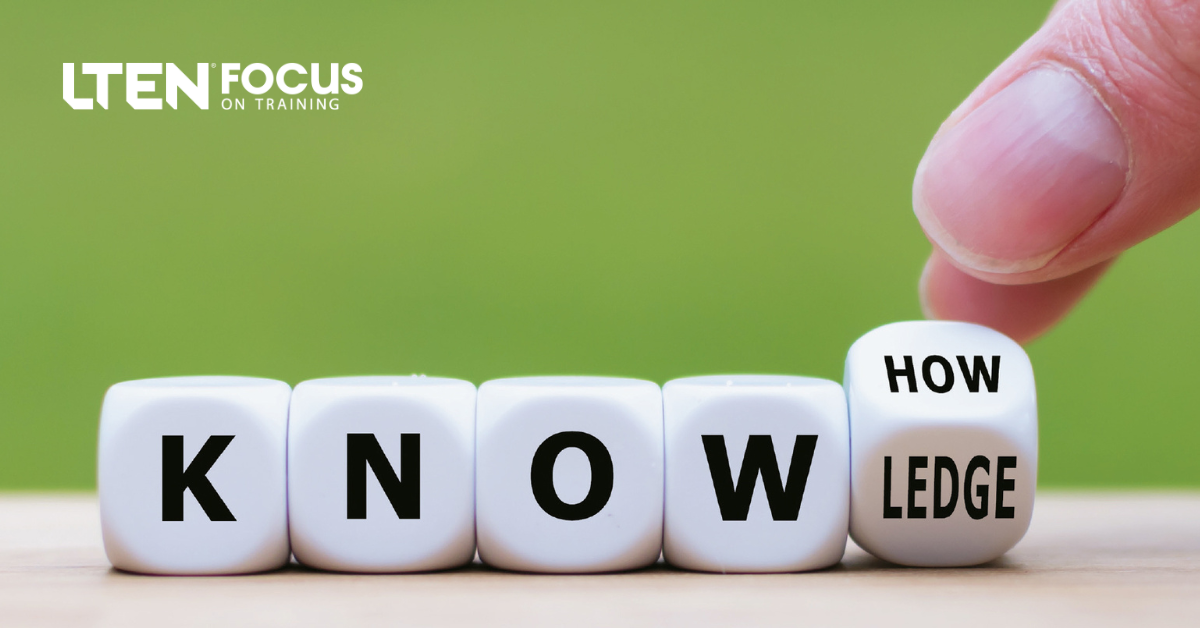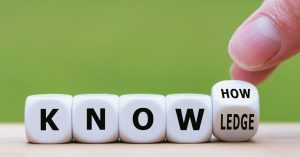
Guest Editor – Nicole Ainsworth
You can be credible without knowing everything
As a trainer, if you find yourself feeling like you’re expected to know everything about your topic, you’re not alone! It’s common for trainers to tend to think they need to know the answer to every question their audience might ask and to feel unprepared when they don’t.
While a solid grasp of the subject is part of what makes a good trainer, it’s important to take a step back and accept that you cannot possibly know everything about every topic you train – nor do you need to. Acknowledging this fact can make you a better trainer, as it allows you to focus on the areas where you excel and seek out information and resources when you need them.
In this article, we will explore the art of being a knowledgeable trainer and why it’s OK to not know everything. We will discuss the benefits of admitting your limitations and practical strategies for establishing and maintaining your credibility as a trainer when you don’t have the answer to every question.
So, let’s dive in and discover the power of embracing your own limitations as a trainer!
Know What You Need to Know
Have you ever sat through a training session where the trainer read directly from the presentation slides or the facilitator guide? If so, chances are you were less than engaged. And, when participants asked questions that were “off-script” and the trainer got flustered, avoided directly answering the questions or appeared to be guessing at the answers, what happened to your confidence in the trainer and your overall learning experience?
While the majority will agree your primary role as a trainer is to facilitate learning, not to be the sole source of knowledge, I would add that to be effective, you must have solid, and in some cases in-depth, knowledge of the content. This will allow you to:
- Transfer knowledge confidently and accurately.
- Ask meaningful questions.
- Facilitate dialogue that encourages the learners to think more broadly, deeply or holistically about the subject.
- Recognize when a different answer or approach may – or may not – be equally satisfactory to the one you’ve presented.
Keeping in mind you don’t have to know everything about the subject you’re training, acquiring the necessary level of proficiency may require you to conduct research, engage with subject matter experts (SMEs), memorize content, explore supplemental resources and/or complete a training course. Once knowledgeable on your subject matter, you can begin applying your expertise as a trainer to developing a training session, course or program that will achieve the specified learning objectives.
Know Where to Go to Know More
Have you ever witnessed a great trainer in action who didn’t have the answers to some of the tricky, context-specific questions, but they knew where to find the answers, when and where to direct their audience for additional information, and how and when to bring in an SME?
As you observed this trainer, you were probably impressed by their ability to confidently navigate the situation and keep the audience focused and on-track. So, how did they do that?
No doubt, this trainer had a solid grasp on their subject matter, but they also knew what resources they could leverage to provide the answers and information they didn’t know.
So, what types of content may be more appropriate to reference rather than commit to memory? The following are just a few examples:
- Answers to questions that are interesting but not tied to the learning objectives.
- Facts or figures that will rarely be requested in the “real world.”
- Scenarios that may confuse the majority or derail the training session.
When you know your resources, you can commit to addressing these types of questions or comments later and can also direct learners to resources that will satisfy their curiosity or enhance their learning outside the classroom. This allows learners to stay focused on the training at hand and builds your credibility.
But what do you do when the level of knowledge or expertise required to effectively train in a subject area is too deep or too vast for you to reasonably acquire and referring to ancillary training resources won’t suffice? You bring in an SME.
Now, this doesn’t mean that you are “off the hook” for developing a certain level of competency on the subject. It’s true the SME’s deep knowledge can fill gaps, but keep in mind that SMEs tend to focus on content. You, as the trainer, must focus on outcomes – participants demonstrating the behavior changes because of the training.
Learners need someone to contextualize the SME’s knowledge transfer, someone to articulate the relevance. And SMEs need someone to keep them on message, on track and on point. This means you must have more than a cursory understanding of the subject to fulfill your role as an effective trainer.
Remember this when you partner with an SME to assist with your training efforts.
Know How to Say You Don’t Know
While in general audiences expect you as their trainer to have some level of subject proficiency, the expectation that you must know everything is often self-imposed. So, if your audience isn’t expecting you to know everything, it should be OK to say you don’t know everything. Right? Right.
With that in mind…
- Be vulnerable: Admitting you don’t know something can increase your credibility as a trainer. Instead of portraying you know everything, focus on building trust with your learners by demonstrating honesty and transparency. Modeling these behaviors can help create an environment where learners feel safe to do the same, and a richer learning experience can occur.
- Facilitate discussion: If you don’t know the answer to a question, it may be appropriate to open it up for discussion. Ask your learners if they have any insights or ideas that could help answer the question. This not only creates amore engaging learning environment, but also demonstrates your respect fort he learners’ experience and expertise, and allows learners to learn from one another.
- Use the “Parking Lot”: If the answer can’t be derived from group discussion, “parking lot” the question and commit to providing the answer or direction to where your learners can find the answer. This gives learners confidence their question will be answered while allowing them to refocus and proceed with the learning experience.
- Share additional learning opportunities: Provide your learners with relevant videos, articles and other resources to further expand their knowledge on the subject and direct them to opportunities where they can continue to develop the skill they just learned. Sharing relevant information and resources beyond your classroom helps demonstrate your broader understanding of the subject and your dedication to your learners’ success. This in turn helps build credibility.
Know the Bottom Line
In conclusion, being a knowledgeable trainer doesn’t mean you have to know everything. By achieving a solid understanding of the subject matter, judiciously leveraging your resources and being honest about your limitations, you can establish and maintain credibility and effectively train your audiences without “knowing it all.”
 Nicole Ainsworth is senior manager, sales training, for Horizon Therapeutics. Email Nicole at nainsworth@horizontherapeutics.com.
Nicole Ainsworth is senior manager, sales training, for Horizon Therapeutics. Email Nicole at nainsworth@horizontherapeutics.com.









